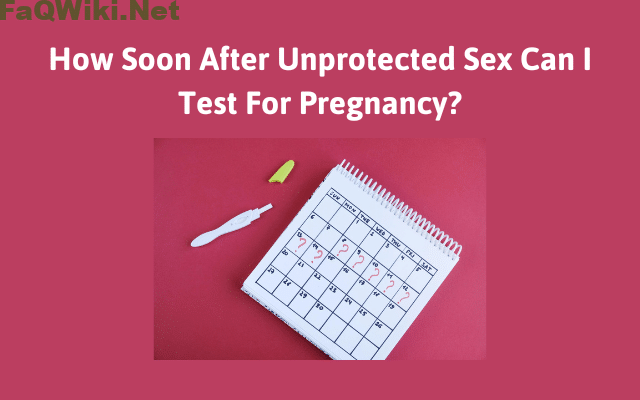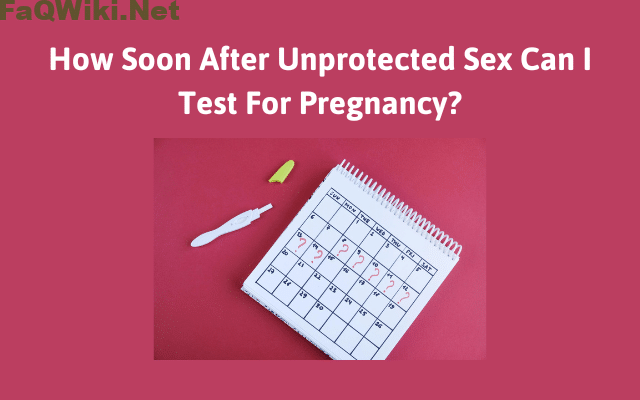How Soon After Unprotected Sex Can I Test For Pregnancy?

If you’re sexually active and not planning to get pregnant, you may wonder how soon after unprotected sex you can test for pregnancy. Early detection is crucial for those who wish to get pregnant and for those who want to take measures to prevent pregnancy. In this article, we’ll explore the topic of pregnancy testing and answer some common questions you may have.

Understanding the Menstrual Cycle
Before we dive into pregnancy testing, let’s briefly review the menstrual cycle and ovulation. The menstrual cycle is a series of hormonal changes that occur in a woman’s body to prepare for pregnancy. Ovulation is the process of the ovary releasing an egg, which is essential for fertilization and pregnancy.
How Pregnancy Occurs?
When an egg is released during ovulation, it can be fertilized by sperm from a male partner. This fertilized egg travels through the fallopian tube to the uterus, where it implants into the uterine lining. The fertilized egg starts to grow into a fetus, and the woman becomes pregnant.
How Ovulation Affects Pregnancy Testing?
If you’re trying to conceive, you’ll want to know when you’re ovulating to time intercourse accordingly. Ovulation can also affect pregnancy testing. The hormone hCG, which is produced by the developing placenta, is detected in pregnancy tests. The timing of when hCG is produced can vary, and it can take time for hCG levels to rise enough to be detected in a test.
Types of Pregnancy Tests
There are different types of pregnancy tests available, including urine tests, blood tests, and home test kits. Urine tests and home test kits are the most commonly used tests. Urine tests can detect pregnancy as early as 10 days after conception. Blood tests can detect pregnancy even earlier than urine tests, as early as 7-12 days after conception.
When to Take a Pregnancy Test?
The earliest time you can take a pregnancy test is determined by when hCG is detectable in your body. In most cases, hCG can be detected in urine tests as early as 10 days after conception. However, the accuracy of the test result can vary depending on when the test is taken. It’s best to wait until after you’ve missed a period to take a pregnancy test for the most accurate results.
Factors That Can Affect the Accuracy of a Pregnancy Test
Several factors can affect the accuracy of a pregnancy test, including certain medications, health conditions, and user error. Some medications, such as fertility drugs, can cause false positives or false negatives on a pregnancy test. Health conditions such as polycystic ovary syndrome (PCOS) can also affect hormone levels and pregnancy test results. It’s important to follow the instructions carefully and to take the test at the right time of day for the most accurate results.
Tips for Accurate Pregnancy Testing
To get the most accurate results from a pregnancy test, there are some tips you should follow. First, take the test first thing in the morning, when the urine is most concentrated. Follow the instructions carefully and make sure you understand how to use the test. If the test result is unclear, wait a few days and take another test.
What to Do If You Get a Positive Result?
If you get a positive result on a pregnancy test, it’s important to confirm the pregnancy with a healthcare provider. Your doctor or midwife can provide advice on how to have a healthy pregnancy, and can answer any questions you may have. You can also find support and resources through organizations such as Planned Parenthood.
What to Do If You Get a Negative Result?
If you get a negative result on a pregnancy test, it’s important to keep in mind that the test may not have been accurate if it was taken too early. Wait a few days and take another test if you still haven’t gotten your period. If you continue to get negative results but have missed your period, it’s a good idea to speak with a healthcare provider. They can help determine if there’s another reason why you’re not menstruating, such as a hormonal imbalance or health condition.
Conclusion
Pregnancy testing is an essential step for anyone who wants to know if they’re pregnant or not. The timing of when to take a pregnancy test can vary depending on the type of test and other factors. The most accurate results are obtained by waiting until after you’ve missed a period to take the test. If you get a positive result, confirm the pregnancy with a healthcare provider. If you get a negative result but have missed your period, speak with a healthcare provider to determine the reason for the missed period.
You can learn more about pregnancy here!
FAQs
Q: How soon after unprotected sex can I take a pregnancy test?
A: You can take a pregnancy test as early as 10 days after conception, but it’s best to wait until after you’ve missed a period for the most accurate results.
Q: Can certain medications affect the accuracy of a pregnancy test?
A: Yes, certain medications such as fertility drugs can cause false positives or false negatives on a pregnancy test.
Q: What should I do if I get a positive result on a pregnancy test?
A: If you get a positive result, confirm the pregnancy with a healthcare provider.
Q: What should I do if I get a negative result but have missed my period?
A: If you get a negative result but have missed your period, speak with a healthcare provider to determine the reason for the missed period.
Q: Can stress affect the accuracy of a pregnancy test?
A: No, stress does not affect the accuracy of a pregnancy test.
Q: Are home pregnancy tests as accurate as tests performed by a healthcare provider?
A: Home pregnancy tests are generally very accurate, but if you’re unsure or have concerns, it’s a good idea to confirm the results with a healthcare provider.
Q: Is it possible to get a false positive result on a pregnancy test?
A: Yes, it’s possible to get a false positive result on a pregnancy test. This can happen if you have recently had a miscarriage or have taken certain medications such as fertility drugs.
Q: How can I improve the accuracy of a pregnancy test?
A: To improve the accuracy of a pregnancy test, be sure to follow the instructions carefully and take the test after you’ve missed a period.
Pregnancy testing can be a nerve-wracking experience, but it’s an important step for anyone who wants to know if they’re pregnant or not. By understanding the factors that can affect the accuracy of a pregnancy test and knowing when the best time to take the test is, you can get the most accurate results possible. If you have concerns or questions about pregnancy testing or any other reproductive health issues, speak with a healthcare provider. They can provide guidance and support to help you make informed decisions about your health.
